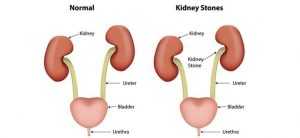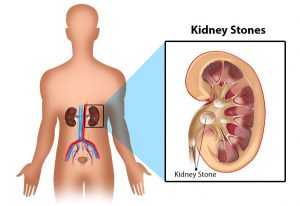A kidney is one of the most essential organs of one’s body. Kidneys perform a number of responsibilities to help keep a healthy body functioning, which includes keeping a balance of water and minerals, eliminating waste from blood after digestion and muscle activity, making an active form of vitamin D needed for bone health and other things. However, a dysfunction may lead to some acute and chronic kidney problems, one such problem is Nephrolithiasis.
This is one of the most common issues related to kidneys, also known as kidney stones. These stones are hard, crystalline mineral material formed within the kidney or urinary tract.
Facts About Kidney Stones:


A person suffering from nephrolithiasis may suffer from some symptoms of kidney stones, which may include severe pain in the side, back, below ribs and while urination. Furthermore, they may feel a pain that radiates to the lower abdomen and groin or comes in waves and fluctuates in intensity. The color of urine may often be pink, red or brown and have a cloudy or foul smell. There is a persistent need to urinate and frequency is more often than usual while urinating small amounts. The person may feel nausea and vomiting and in case of infection, they may also develop fever and chills.
Read Also: 5 Best Nephrologists in Lahore
Etiology (causes) of Nephrolithiasis
Kidney stones often have no definite, single cause, although several factors involve for its existence. Here are 5 Causes we bet you didn’t know:
- High calcium in urine also known as hypercalciuria is an inherited condition which causes stones in most cases. In this condition the absorption of calcium from food in increased which then is excreted into the urine, where it may form calcium phosphate or calcium oxalate kidney stones.
- A person may also be vulnerable to increase the risk of stone formation due to their dietary factors and practices. Dehydration and inadequate fluid intake, in particular, is one of the major factors of stone formation. Other dietary habits which contribute to this problem may include high intake of sugar salt and animal protein along with excessive Vitamin D supplement consumption.
- Some medications may also lead to a high risk of developing kidney stones for example diuretics, calcium-containing antacids and the protease inhibitor indinavir, a drug used to treat HIV infection.
- Chronic Diseases such as diabetes and high blood pressure are also contributors of developing stones in the kidney.
- People with inflammatory bowel disease and those who have undergone an intestinal bypass or ostomy surgery are also at increased risk for these stones.

Treatment in Pakistan for Kidney stones
There are several ways to treat these stones both surgical and nonsurgical. Surgical treatments may include endoscopy, open surgery, and JJ insertion, this practice involves excruciating pain and blood loss. However, with improved technology one may opt for nonsurgical procedures, for example, lithotripsy and holmium laser which are comparatively less painful.
Technology has further made ones lives easier and in no time can a patient find and consult a Nephrologist
for the treatment of kidney stone in Lahore, Karachi, Islamabad and other cities of Pakistan within a click.





